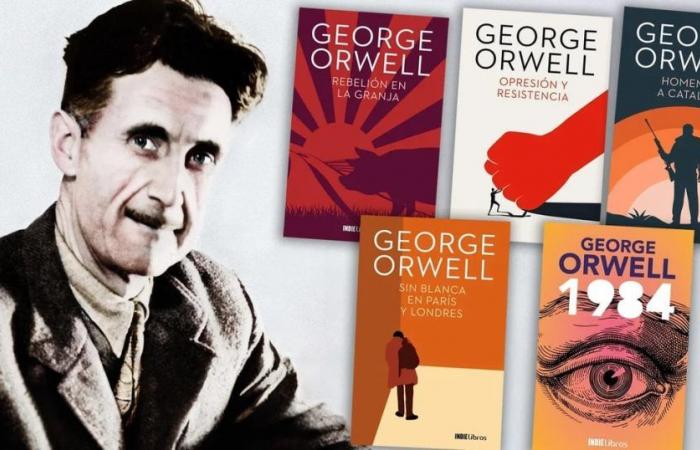
[Varios libros de George Orwell pueden leerse gratis en BajaLibros ingresando acá]
Under the name of Eric Arthur Blairin Motihari, a city in India that belonged to the British Raj, a colony of the English, was born George Orwell. It was in the year 1903, precisely on June 25, 1903, 121 years ago today. His father was an administrator of the opium ministry of the colonial government and among his ancestors was Charles Blair, owner of hundreds of slaves in Jamaica. But the course of this sensitive and reading boy was completely different.
He was barely two years old when he arrived in England. He went with his mother, a Burmese-born woman of French descent. He also with his older sister. She saw his father again in 1907, it took three months and the man returned to India. At the age of six he was sent to his mother’s country, also a British colony, to a small Anglican parish school. His teachers were surprised by his intelligence and recommended him to one of the best schools in England.
St. Cyprian’s school, which he attended on a scholarship, was a stepping stone to the next two: Wellington and Eton. There he would meet some of his friends, renowned intellectuals such as Cyril Connollymagazine editor horizon, where he published several essays. After completing his education, he joined the Indian Imperial Police in Burma, spent five years and returned to England with a hatred of imperialism that would mark his militancy and his literature.
And it all starts with a name. George Orwell It is a pseudonym that he adopted in 1933. Once in England he did not want to return to his parents’ house, so he began to work on what he first found while bordering on destitution. At that time he was a school teacher and a bookseller in a used store. He then went to Paris, to live at his aunt’s house, and got a job as a dishwasher in a luxurious hotel. Until he had to knock on his parents’ door.
When he got a job at the newspaper New Adelphi and later as a school teacher, he managed to complete his first book: Broke in Paris and London, a long semi-autobiographical non-fiction text that he decides to sign with another name so as not to make his parents uncomfortable. George because it is a name with great tradition in the English countryside. AND Orwell because of the Suffolk River and because a surname beginning with the letter O would give his books a better position on bookstore shelves.
Orwell He was left-wing, anti-imperialist and anti-nationalist, and he joined the Spanish Civil War to fight with the republican side or “red side”, as it was called. The enemies: the fascists. That experience marked him forever. In 1946 he said this: “Every serious line I have written since 1936 has been, directly or indirectly, against totalitarianism and in favor of democratic socialism as I understand it.”
On Christmas 1936, he traveled to Paris and met Henry Millerwho was known through letters. Orwell I had defended him after the departure of Tropic of Cancer (1934), a novel that was censored by the American government. That night, as they say, they talked at length about literature, but more about politics. Orwell He expressed the need to go to Spain. “Why,” Miller asked, “what are you going to do there?” “I’m going to kill fascists, someone has to do it,” he responded.
His participation in the War ended in Huesca when a throat wound nearly killed him. The American Volunteer Harry Milton He described to the press, many years later, that Orwell’s reckless attitude, added to his height of 1.88, led him to that end: “I heard the clear sound of a gunshot at high speed and Orwell immediately fell on his back.” Milton stopped the bleeding and gave him first aid, until they could take the writer to a hospital.
In 1947 Orwell He settles on the island of Jura, in Scotland, to do what he likes most: writing. He has a novel in mind that he had outlined in notes in 1944. In a letter to his literary agent, F.J. Warburgdated October 22, 1948, Orwell He stated that the idea of writing the novel had occurred to him in 1943, and that he was still hesitating whether to title it The last man in Europe and 1984. At that time he had tuberculosis and the disease grew in symptoms and illnesses.
It was finally published on June 8, 1949 under the title that Warburg advised him to be more commercial. However, its origin is not known. The reasons come and go: the centenary of the Fabian Society, founded in 1884? A nod to the novel by Jack London, The Iron Heelfor the date on which the political party takes power? Reference to the story of G.K. Chestertonone of your favorite authors, “The Napoleon of Notting Hill”, set in 1984?
Specific, 1984 It is a dystopian fiction novel but above all political. From this text, the concepts of the omnipresent and vigilant Big Brother, Room 101, the ubiquitous Thought Police and Newspeak became popular, an adaptation of the English language in which the lexicon is reduced and transformed for repressive purposes. based on the principle that what is not part of the language cannot be thought.
Even today, bridges are built between the novel and today. Manipulation of information, censorship, repression and surveillance are present elements that show us 1984 suggesting that dictatorship is always a possibility. So why is the novel called that? The most likely answer is the one given Peter Davisonone of his biographers: the result of exchanging the position of the last two digits of the year in which it was written.
There is no doubt: it is a key book in the great history of literature. Francisco Marzionia science fiction specialist, said that “1984 proposes a dystopia but no one agrees on who is responsible,” and adds: “For me it is not a dystopian book because it taught me, when I was fifteen, that could resist to a difficult world simply by reading a book, that reading a book is an act of resistance, and that is utopian.”
[“1984″ de George Orwell puede leerse gratis en BajaLibros ingresando acá]
A few years ago, the authorities of the New York Public Library said that the novel that was borrowed the most throughout its history, after children’s books A snowy day of Ezra Jack Keats and The doodle cat of Dr. Seussis 1984. The work of the British writer has half a million loans.
It is a book that can be found in any bookstore, that is on the Internet, that circulates in schools, that is highly topical. Orwell is still among us.





